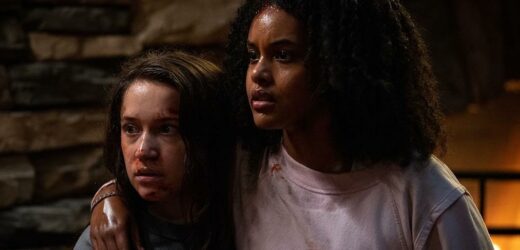If COVID doesn’t kill you, the tall guy with the hunting knife probably will. That’s the hook in John Hyams’ “Sick,” which makes clever work of an ongoing health scare, and especially the way that college-aged kids dealt with CDC restrictions — often by ignoring them — adding a few disposable undergrads to the pandemic’s otherwise tragic body count. That’s what’s so compelling about this quick-turnaround collaboration from Kevin Williamson and “Scream” assistant-turned-co-writer Katelyn Crabb, now streaming on Peacock: You’re never really sure whether you should be rooting for its inconsiderate young coeds or counting on a slasher to teach them a lesson.
Playing on our lingering paranoia, “Sick” kicks off with a scene that recalls the early, uncertain days of the pandemic. A college kid named Tyler (Joel Courtney) wanders an apocalyptic-looking grocery store whose shelves have been emptied of TP and other essentials. He’s masked and doing his best to social distance when texts from an unknown number start popping up on his phone, asking if he’s game to hang out. Tyler seems intrigued. Never mind that there’s a nationwide quarantine in place. As the texts grow more persistent, Tyler starts to grow uneasy. By the time he’s back in his dorm room, he’s thoroughly creeped out — with good reason. No amount of PPE can protect him from the blade-wielding psycho who’s followed him home.
It’s an impressively staged opening that demonstrates straight out of the gate that Hyams can handle the codes of the slasher genre. (Blumhouse came on after the film was finished.) The camera hovers a little too close to Tyler throughout the scene, playing tricks where it sees things he can’t — like a closet door opening to reveal a tall, threatening figure in the background — before adopting his perspective once audiences know the killer is probably behind him. DP Yaron Levy, who’s worked on both “Scream: The TV Series” and Hyams’ last “Universal Soldier” movie, lenses this and later sequences in long, fluid takes that put us uncomfortably close to the action: We’re not just within stabbing distance, but near enough to catch COVID.
Cut to besties Parker (Gideon Adlon) and Miri (Bethlehem Milton) bending the rules by driving out to a vacation home where they plan to wait out the worst of the pandemic together. Fauci schmauchi. Depending on your own position re: masking, Parker’s casual, too-cool-for-quarantine attitude may trigger certain judgments — or identification. Instead of testing, she presumes that a lack of symptoms and a full-power sense of smell means she’s negative, potentially putting those around her at risk. And if such precautions don’t matter to her, should we care when a genuine threat shows up at the ridiculously posh resort home? She’s already been getting texts. Meanwhile, oversharing on social media makes it easy for any stalker to find her. Kinda makes you feel sorry for Miri, who’s endangered by association.
The rest plays out like a well-oiled and largely effective “Scream” knockoff, which is basically what it is, minus the meta-humor and, frankly, a cast worth caring about. Williamson and Crabb have jettisoned the old-school sense of judgy sex negativity, where the “sluts” get slashed, while introducing a different kind of moralism: Here, one’s comportment during pandemic dictates your ultimate chances of survival. It’s best to let audiences discover the reaper’s motives in context; suffice to say that “Sick” not only factors in our still-evolving COVID-era rules, but also serves as an amusing time capsule for the collective fear that‘ have’s seized us these past three years.
Indie-movie darling Jane Adams (“Hacks”) makes an appearance late in the film as a woman who happens to be driving by while Parker is being terrorized in the woods. The poor girl is clearly panicked, pursued by a crazy guy responsible for at least three murders, and yet this Karen-esque stickler refuses to let Parker into her car until she agrees to put on a face mask. Long after every other detail of the movie has faded from memory, that scene ought to leave a lasting impression, as Parker’s ambivalence toward guidelines intended to save her life and others’ comes back to haunt her.
Read More About:
Source: Read Full Article


